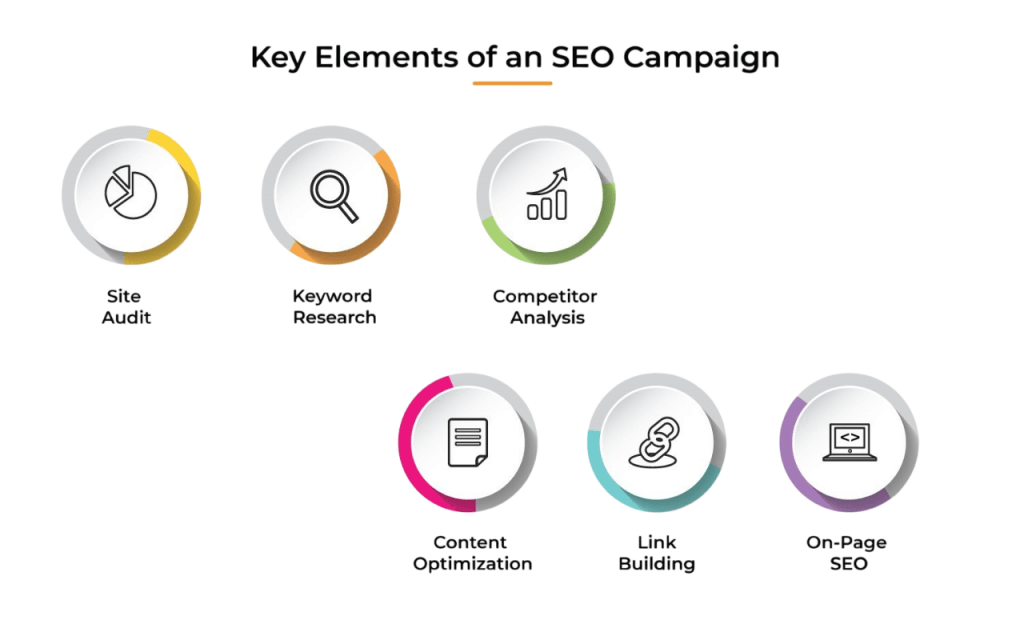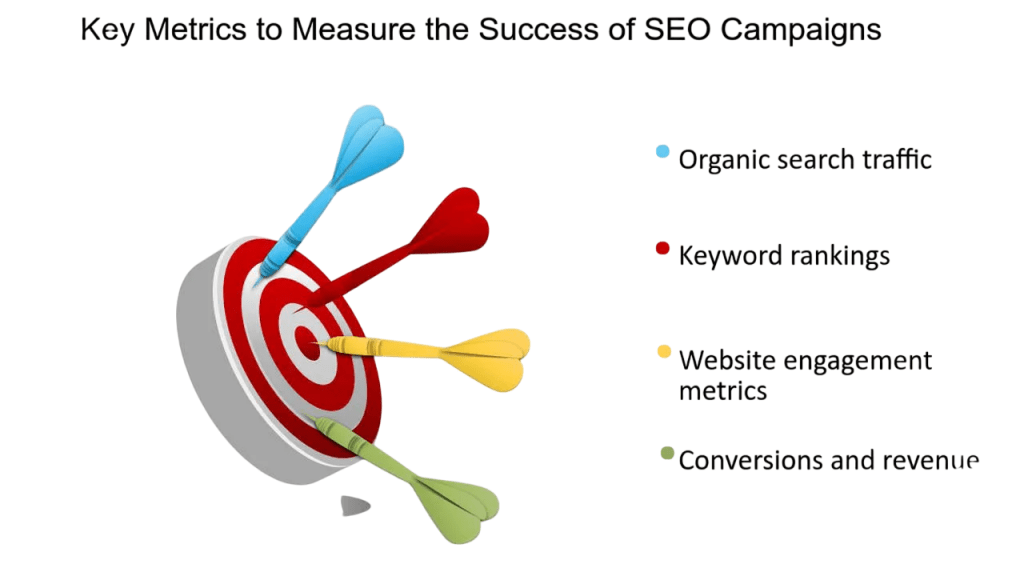
- What is an SEO Campaign?
- Why Conduct an SEO Campaign?
- Key Components of an SEO Campaign
- How to Plan an Effective SEO Campaign
- Common SEO Campaign Strategies
- Tools to Support SEO Campaigns
- Measuring SEO Campaign Success
- Challenges in SEO Campaigns and How to Overcome Them
- Conclusion
What is an SEO Campaign?
An SEO campaign is a coordinated set of actions and strategies aimed at improving a website’s ranking on search engine results pages (SERPs) for specific keywords or topics. The goal of an SEO campaign is to increase organic (non-paid) traffic, improve brand visibility, and ultimately generate leads or sales through search engines.Unlike ad campaigns that depend on paid placements, an SEO campaign focuses on optimizing various aspects of a website and its content to meet search engine ranking criteria and user intent.An SEO campaign is a strategic and coordinated set of actions aimed at improving a website’s visibility and ranking on search engine results pages (SERPs). The primary goal of an SEO campaign is to increase organic (non-paid) traffic by optimizing various elements of a website and its online presence. This process involves thorough keyword research to identify the most relevant and valuable search terms that potential customers use. It also includes on-page optimization, such as improving meta tags, Digital Marketing Training headings, content quality, and website structure to make the site more search-engine friendly. Off-page SEO is another crucial part of the campaign, focusing on building high-quality backlinks from reputable websites to enhance domain authority and credibility. Technical SEO addresses site speed, mobile-friendliness, crawlability, and fixing any issues that could hinder search engine indexing. An effective SEO campaign is data-driven, using analytics and tracking tools to monitor performance, user behavior, and rankings. Based on this data, marketers adjust strategies to maximize results. The campaign typically runs over several months, as SEO is a long-term effort that requires ongoing optimization. Ultimately, an SEO campaign aims to attract targeted traffic,Key Components of an SEO , improve brand visibility, and generate leads or sales by aligning the website with search engine algorithms and user intent.
Ready to Get Certified in Digital Marketing? Explore the Program Now Digital Marketing Online Training Offered By ACTE Right Now!
Why Conduct an SEO Campaign?
There are several reasons why businesses should invest in SEO campaigns:
- Increase Organic Traffic: A well-optimized website attracts more visitors without the cost of paid ads.
- Build Trust and Credibility: Higher search rankings often convey authority and trustworthiness to users.
- Cost-Effective Marketing: SEO offers a better long-term return on investment compared to many paid advertising methods.
- Targeted Reach: SEO helps attract users actively searching for products or services related to your business.
- Competitive Advantage: Many businesses compete for the same audience, Digital Marketing Metrics and an effective SEO campaign can help you outperform competitors.
Key Components of an SEO Campaign
An SEO campaign is a multifaceted effort involving several critical components:
- Keyword Research: Identifying relevant search terms that your target audience uses to find products or services like yours.
- On-Page Optimization: Optimizing individual web pages, including titles, headings, meta descriptions, URLs, Click-Through Rate in Digital Marketing and content structure.
- Technical SEO: Ensuring that the website’s backend such as site speed, mobile-friendliness, crawlability, and security is optimized for search engines.
- Content Creation and Optimization: Producing high-quality, relevant content that satisfies user intent and encourages engagement.
- Link Building: Acquiring high-quality backlinks from authoritative websites to improve domain authority and rankings.
- Local SEO (if applicable: Optimizing for local search queries and managing local listings to attract customers in specific geographic areas.
- Monitoring and Reporting: Tracking performance metrics and adjusting strategies based on data and trends.
- Identify what you want to achieve with your SEO campaign more traffic, higher sales, improved brand awareness, etc.
- Analyze your website’s current SEO status to identify strengths, weaknesses, and opportunities.
- Use tools to find keywords with good search volume and achievable competition levels related to your business.
- Study your competitors’ SEO strategies to find gaps and areas where you can outperform them.
- Outline the specific tactics you will use, Digital Marketing Training including on-page SEO, content marketing, link building, and technical improvements.
- Implement the planned actions, prioritizing based on impact and resources.
- Use analytics and SEO tools to track progress and identify what’s working or needs adjustment.
- SEO is ongoing; continuously refine your tactics based on results and algorithm changes.
- Content Marketing: Publishing blog posts, articles, infographics, videos, and other content that attracts and engages your audience.
- On-Page SEO: Optimizing page titles, meta descriptions, headers, and internal linking to enhance relevance and crawlability.
- Technical SEO: Improving site speed, fixing broken links, creating XML sitemaps, ensuring mobile responsiveness, SEO Tips To Rule Google Maps and implementing HTTPS.
- Link Building: Outreach to gain backlinks from reputable sites, guest posting, and digital PR.
- Local SEO: Optimizing Google My Business profiles, citations, and localized content for local search dominance.
- User Experience Optimization: Improving website navigation, layout, and page load times to keep visitors engaged.
- Keyword research tools (e.g., Google Keyword Planner, Ahrefs).
- Website audit tools (e.g., SEMrush, Screaming Frog).
- Analytics platforms (e.g., Google Analytics).
- Rank tracking software (e.g., Moz, SERPWatcher).
- Backlink analysis tools (e.g., Majestic, Ahrefs).
- Organic Traffic: The number of visitors arriving via search engines.
- Keyword Rankings: Changes in positions for targeted keywords on SERPs.
- Conversion Rate: Percentage of visitors completing desired actions (sales, signups).
- Bounce Rate: How many visitors leave after viewing only one page.
- Backlink Profile: Number and quality of inbound links acquired.
- Page Load Speed: Impact on user experience and SEO rankings.

To Explore Digital Marketing in Depth, Check Out Our Comprehensive Digital Marketing Training To Gain Insights From Our Experts!
How to Plan an Effective SEO Campaign
Planning is critical for the success of an SEO campaign. Here is a step-by-step guide:
Step 1: Define Clear Goals
Step 2: Conduct an SEO Audit
Step 3: Perform Keyword Research
Step 4: Analyze Competitors
Step 5: Develop a Strategy
Step 6: Execute the Campaign
Step 7: Monitor Performance
Step 8: Refine and Repeat
Common SEO Campaign Strategies
Looking to Master Digital Marketing? Discover the Digital Marketing Expert Masters Program Training Course Available at ACTE Now!
Tools to Support SEO Campaigns
Successful SEO campaigns rely on several tools to gather data, analyze performance, and manage tasks. Commonly used tools include:
Digital Marketing Certification Process, Using the right combination of tools helps optimize campaign efficiency and accuracy.
Measuring SEO Campaign Success
Measuring SEO the effectiveness of an SEO campaign involves tracking various Key Performance Indicators (KPIs), Top Digital Marketing Experts:

Regular reporting on these metrics allows marketers to make informed decisions and improve the campaign continuously.
Challenges in SEO Campaigns and How to Overcome Them
SEO Campaign Strategies often face several challenges that can hinder their success if not addressed strategically. One major issue is algorithm changes by search engines like Google, which can suddenly impact rankings; staying updated with industry news and following SEO best practices can help minimize the effects. High competition for popular keywords is another obstacle, especially in saturated markets this can be overcome by targeting long-tail keywords and focusing on niche audiences. Technical issues, such as slow page load times, broken links, or poor mobile optimization, TensorFlow can also negatively affect performance, but regular site audits and technical SEO improvements can resolve these problems. Content quality and consistency are other common hurdles; creating high-value, original content that matches user intent is essential for ranking well. Additionally, building high-authority backlinks remains difficult but can be addressed through guest posting, partnerships, and producing shareable content. Lastly, measuring ROI in SEO can be complex due to its long-term nature, but using tools like Google Analytics and Search Console helps track performance and justify efforts. By identifying these challenges early and applying proactive, data-driven solutions, businesses can strengthen their SEO campaigns and achieve sustainable growth in organic visibility.
Preparing for Digital Marketing Job Interviews? Have a Look at Our Blog on Digital Marketing Interview Questions and Answers To Ace Your Interview!
Conclusion
An SEO campaign is a Strategy and continuous effort to improve a website’s visibility and drive organic traffic through search engines. By understanding the components, planning effectively, using the right tools, and monitoring progress, businesses can build successful SEO campaigns that enhance brand presence and generate tangible results. While SEO requires patience and consistent effort, its cost-effectiveness and long-term benefits make it an essential part of any digital marketing strategy. If you are considering launching an SEO campaign, Digital Marketing Training be prepared to invest in quality content, technical optimization, and ongoing analysis to stay ahead of competitors and meet the needs of your audience.




